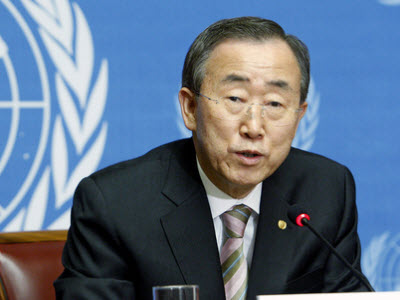
Ban Ki-moon condemned in particular the indiscriminate shelling by the M23 rebels, which caused deaths, injuries and damage to the civilian population in eastern DRC, Rwandan border areas and among peacekeepers.
The U.N. Secretary-General urged “all parties to pursue an inclusive political process which addresses the root causes of the conflict” in eastern Democratic Republic of Congo.
He also called on all regional actors to exercise utmost restraint and to refrain from any action or statement that may result in further deterioration of the situation.
Ban Ki-moon stressed that those who obstruct the current processes and those who violate international law must answer for their actions.
The statement said that the U.N. Special Envoy for the Great Lakes, Mary Robinson, and the U.N. Secretary-General's Special Representative for the DRC, Martin Kobler, are engaged right now in intense diplomatic efforts in order to improve the current situation.
Mr. Kobler conducted a 24-hour visit to Rwanda where he discussed the military crisis in North Kivu and the socio-political situation in the Great Lakes region, with the Rwandan Minister of Foreign Affairs, Louise Mushikiwabo, and the Minister of Defence, Gen. James Kabarebe.
For its part, the South African military has severely warned the M23 rebels against any attempt to take Goma, which they occupied in November 2012. The head of the South African Joint Command, Lt. Gen. Derrick Mgwebi, made the statement on Friday during a press briefing in Pretoria.
South Africa has 1,345 soldiers in the new U.N. intervention brigade deployed in eastern Congo.
Related articles
- • DRC and Rwanda Sign Declaration of Principles for Peace in Eastern Congo (April 25, 2025)
- • European Union Sanctions Rwanda and M23 Officials over Congo Conflict (March 17, 2025)
- • Canada and Germany Impose Sanctions on Rwanda for Supporting M23 Rebels (March 4, 2025)
- • UK Suspends Financial Aid to Rwanda Over M23 Rebellion (February 25, 2025)
- • European Union Suspends Defence Consultations with Rwanda (February 24, 2025)
- • Tshisekedi Announces Government of National Unity and Calls for Unity Against M23 Rebels (February 23, 2025)
- • UN Security Council Calls on Rwanda to Stop Supporting M23 Rebels in DR Congo (February 22, 2025)
- • US Sanctions Rwanda's Minister James Kabarebe for Central Role in DR Congo Conflict (February 20, 2025)
- • Rwanda-Backed M23 Rebels Summarily Executed Children in Bukavu, UN Reports (February 19, 2025)
- • DR Congo Citizens Head to Polls to Elect President, Members of Parliament (December 20, 2023)
- • 'Deadly environment' plus 'political and social' obstacles hinder Ebola fight, Security Council hears (July 24, 2019)
- • Ebola outbreak declared an international Public Health Emergency (July 17, 2019)
- • Constitutional Court Declares Tshisekedi Winner of Presidential Election (January 19, 2019)
- • At least 30 dead after massacres in Ituri (March 2, 2018)
- • Botswana Urges Joseph Kabila to Step Down (February 26, 2018)
- • Peacekeepers, Congo Army to Resume Joint Fight Against Rwandan Rebels (January 28, 2016)
- • Political tensions 'running high' in DR Congo ahead of 2016 elections (October 7, 2015)
- • UN Report Blames Ugandan Islamists for 237 Killings in DR Congo (May 14, 2015)
- • DRC Army Putting Pressure on FDLR (April 1, 2015)
- • Denis Mukwege Wins Sakharov Prize 2014 (October 21, 2014)
- • Violence in North Kivu Kills 21, Mostly Women, Children (October 18, 2014)
- • Senior UN officials urge Brazzaville to halt expulsion of DR Congo nationals (May 26, 2014)
- • Kerry Calls on Kabila to Honor Constitution (May 4, 2014)
- • Kerry in DR Congo for Security Talks (May 3, 2014)
- • Security Council extends UN mission, intervention force in DR Congo for one year (March 28, 2014)
- • Death toll in Lake Albert boat accident rises to 251 (March 27, 2014)
- • Bosco Ntaganda Attacked Civilians on Ethnic Grounds, ICC Prosecutor Says (February 10, 2014)
- • New DR Congo amnesty law welcomed by UN envoys (February 5, 2014)
- • Colonel Mamadou Ndala Is Killed in Ambush (January 2, 2014)
- • DR Congo, M23 Rebels Sign Declarations Marking End of Kampala Peace Talks (December 12, 2013)







